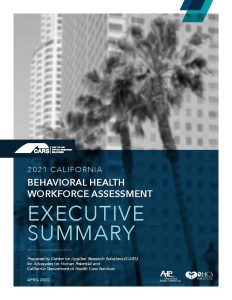Major Findings from Survey of California Behavioral Health Workforce Released

The California Department of Health Care Services (DHCS) today released major findings and recommendations from a large-scale effort to collect data about the California behavioral health workforce. Reports can be accessed at Center for Applied Research Solutions Behavioral Health Workforce Assessment | CABHWD and be used by organizations and leaders to help expand, elevate, enhance and empower behavioral health workforce in every California community.
More than 1,600 members of the workforce responded to the Fall 2021 California Behavioral Health Workforce Assessment survey. The survey collected vital information about respondents’ demographics, educational and professional backgrounds, current employment, communities served, and use of telehealth services.
The survey also included questions related to peer support services and providers in the context of California’s current initiative to establish Peer Specialist as a provider type under DMC-ODS and SMHS programs. Focused small-group listening sessions were held with representatives of 30 peer-run organizations throughout the state to further explore these issues.
This assessment is part of DHCS’ Behavioral Health Workforce Development (BHWD) funding that supports two peer organization grant programs, as well as a behavioral health services internship program, which are administered by Advocates for Human Potential, Inc. (AHP). AHP partnered with the Center for Applied Research Solutions (CARS) for the workforce assessment component, which is now available.
Highlighted survey findings include:
- Women comprise the majority of the behavioral health workforce: 64% are cisgender women.
- One in three (32%) respondents are Hispanic or Latino/a/e.
- The workforce is educated and experienced: 76% of respondents have a college or graduate degree, and 42% of respondents have been in the behavioral health field for more than 10 years.
- Many have lived experience: 35% of respondents identify as a family or caregiver of a person with behavioral health needs, and 32% have experienced a personal mental health challenge.
- Burnout and need for better benefits, pay, and/or family time are adversely affecting workers’ plans for the future.
The assessment report identifies seven key recommendations for supporting, strengthening, and expanding the behavioral health workforce to improve Californians’ access to quality behavioral health care:
- Support data-driven decision-making and policy by collecting nuanced behavioral health workforce data.
- Create, expand and strengthen career pathways for racially, ethnically, linguistically and culturally diverse behavioral health providers.
- Increase pay and benefits for the behavioral health workforce. Address disparities between peer and non-peer staff.
- Address provider burnout and compassion fatigue. Support parents and caregivers.
- Prioritize supports for unserved, underserved and inappropriately served communities. Invest in equity-driven strategies and wraparound supports.
- Provide additional training and technical assistance to expand telehealth.
- Invest in training initiatives and programs that support integration of peers. Include and promote peer voice and leadership.
Access the Behavioral Health Workforce Assessment Report, Executive Summary, and Infographic to learn more about these findings and recommendations: Center for Applied Research Solutions Behavioral Health Workforce Assessment | CABHWD).
About Us
Advocates for Human Potential, Inc. (AHP) creates powerful solutions to improve health and human services systems. By partnering with the federal government, states, municipalities, healthcare systems, and nonprofits, we help people experiencing the greatest disadvantages lead full and productive lives. We are national leaders in training and technical assistance, research and evaluation, publishing, and dedicated consulting. On issues from workforce development to mental health, substance use disorders to housing and homelessness, we help our clients enhance behavioral health care through systems change. AHP was founded nearly 40 years ago to develop solutions for some of the biggest social infrastructure challenges across the nation. Our company has offices in metro Boston, Chicago, Los Angeles, Phoenix, and Tampa. Find out more at www.ahpnet.com.
For press inquiries, please contact newsroom@ahpnet.com.
